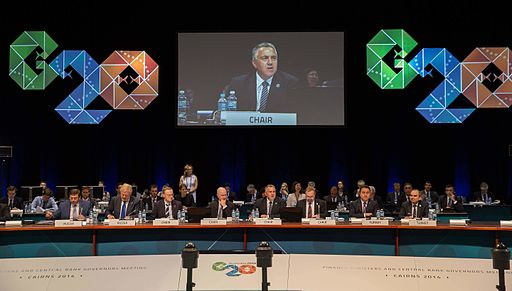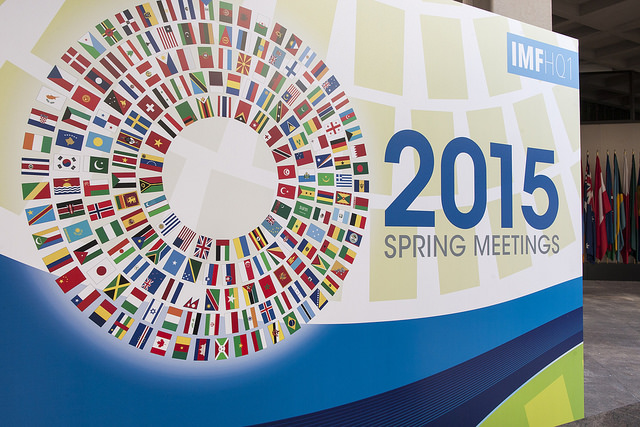The new administration’s key economic objective is to sustain economic growth in the United States. Accomplishing this objective requires a growing global economy. To achieve this precondition, the administration must establish a policy

The Trump administration should convene a high-level meeting of finance ministers, similar to the Group 20 finance ministers meeting.
framework to coordinate macroeconomic policies, engage with international financial institutions, and support financial regulatory institutions.
Accordingly, the Trump Administration should convene a high-level meeting of finance ministers of the industrial countries to implement cooperative reflation of the global economy, much along the lines of the 1985 Plaza Accord, which ratified the systematic depreciation of the U.S. dollar.
Policy coordination
The U.S. should broker an agreement among the heads of the major economic powers (particularly industrial economies) for greater fiscal stimulus and less reliance on monetary policy to support economic growth. Given that some countries with large current account surpluses are unwilling to expand fiscal policy in the absence of some inducements, the U.S. must be willing to offer incentives for cooperation. Increased—rather than reduced—access to U.S. markets is one possibility.
With the dollar likely to continue to strengthen, thereby deteriorating U.S. competitiveness in international markets, this effort takes on heightened importance. The more the U.S. can get its trading partners to reflate, the less the deterioration in the U.S. trade balance, and the better the manufacturing sector can perform.
Minimizing currency manipulation
To implement the president’s commitment to halting currency manipulation, it’s critical to move deliberately. The United States has already unilaterally moved toward defining currency manipulation in the Trade Facilitation and Trade Enforcement Act of 2015. Some of the act’s prerequisites for a country to be labeled as a currency manipulator make sense, while others do not. Hence, what’s needed is the development of a common set of standards that other parties can agree on internationally. In doing so, we will have common terms of reference so that countries that do attempt to manipulate their currencies can be sanctioned. This process is important insofar as countries need to constrain efforts to gain aggregate demand at the expense of others by way of beggar-thy-neighbor currency policies.
Past experience has shown that it is hard for parties to agree to a common definition of currency manipulation. Hence, the United States will have to exercise leadership in defining, and punishing, such activities. Attempts to define unilaterally currency manipulation will invite retaliation, where other countries will have greater latitude than the U.S. to react. In this context, the president must avoid officially declaring countries as currency manipulators in contravention of current U.S. law.
International aspects of tax reform
The implementation of changes to the tax code aimed at improving U.S. competitiveness, such as the destination-based cash flow tax (DBCFT), runs the risk of violating rules agreed to by the United States as a member of the World Trade Organization. Specifically, the DBCFT is likely to violate the equal treatment of domestic and foreign firms. To avoid providing bases for other countries to retaliate against the U.S., the administration must seek to make the new tax system consistent with existing rules.
Crisis prevention

If foreign exchange reserves fall to a low level, some countries will need the International Monetary Fund (IMF) to stabilize their economies.
Emerging market economies now constitute a much larger share of the world economy, and the susceptibility of those economies to financial crises poses a much greater threat to the economic well-being of the United States. Hence, additional steps are needed to avoid financial crises by way of enhancing the global financial safety net.
So far, emerging market economies have fended off external crises by virtue of large foreign exchange reserves. The commodity boom over the past decade led to a sizable buildup of foreign exchange reserves, and those reserves are now being disbursed. At some juncture, reserves will fall to a sufficiently low level in some countries so that they suffer balance of payments crises. Adequate International Monetary Fund (IMF) resources to stabilize such countries will be necessary.
The IMF has already implemented a number of measures to increase the resiliency of emerging markets against sudden stops and other balance of payments problems. These measures have been made credible in part by the doubling of IMF resources, made possible by the passage of the December 2015 omnibus spending bill. These include preestablished credit lines in the form of the Flexible Credit Line (FCL) facility for countries with strong fundamentals. Those countries are exactly the ones least likely to need financing; for those, the Precautionary and Liquidity Line (PLL) facility has been implemented. Only three countries (Colombia, Mexico, Poland) have used the FCL, with none drawing on those lines. Only two countries (the former Yugoslav Republic of Macedonia and Morocco) have used the PLL.
Progress on international financial regulation
Harmonization of international regulation of international banking will ensure that U.S. banks face a level playing field. Under the Basel III agreement, the Financial Stability Board (FSB) coordinates the tightening of financial regulations necessary to prevent a replay of the 2008 financial crisis. This ongoing process is an essential ingredient to prevent backsliding on increasing the robustness of the international financial system against runs and shocks to assets and, hence, bank capital. However, at the moment the FSB acts as a consensus body, unable to enforce any decisions that are made. The only leverage the body has is by way of peer review reports, whereby the process of “name and shame” is used to prod countries into action. In addition, those consensus decisions are also made in a less than fully transparent manner, limiting the perceived legitimacy of the institution’s recommendations. Making the board’s decisions more transparent, and visible, is therefore of paramount importance.
In addition, the administration must prevent any delay on the implementation of macroprudential measures under the auspices of the Basel III agreement. The primary determinant of a financial crisis is a credit boom, which can occur when a self-reinforcing feedback loop is established between lending and asset booms. One concrete manifestation of backsliding is the European Commission’s recent decisions to soften capital standards; were they to be implemented, U.S. banks would be placed at a disadvantage relative to European financial institutions.
These initiatives will be implemented by way of a coordinated process involving most importantly the U.S. Treasury and the Securities and Exchange Commission for international financial regulation via the FSB.
The process by which international financial regulatory agreements are negotiated is extremely technical and dependent on the participation of individuals within the bureaucracies who possess the requisite expertise.
With the elevated status of issues regarding currency manipulation, it is important to ensure that the process of identifying currency manipulators remains as technocratic and insulated from political pressures as possible. Otherwise, it will become all too easy to label countries as manipulators so as to rationalize protectionist measures.
In the area of fostering macroeconomic coordination, the new president should signal a new approach to managing international economic relations, particularly as they pertain to external balances and employment. The Council of Economic Advisers should be charged with developing specific policies for fostering employment growth, with a special aim of mitigating the pain associated with adjustment to international trade competition and facilitating the movement of labor from declining, import-competing sectors to rising, export-oriented industries.
In support of the key objective of sustained economic growth, the Trump Administration should coordinate international macroeconomic policy, cooperate on international financial regulation, and support sustainable developing country growth. Achieving these goals within the first year will require working within the current bureaucratic structure and system of international financial cooperation.
Rather than turning inward, it is now even more important for the administration to coordinate efforts internationally, to ensure that the goal of accelerated U.S. growth is not stymied by increased imports and decreased exports. One concrete step would be to organize high-level meetings at the finance minister level to coordinate macroeconomic, financial, and trade policies.